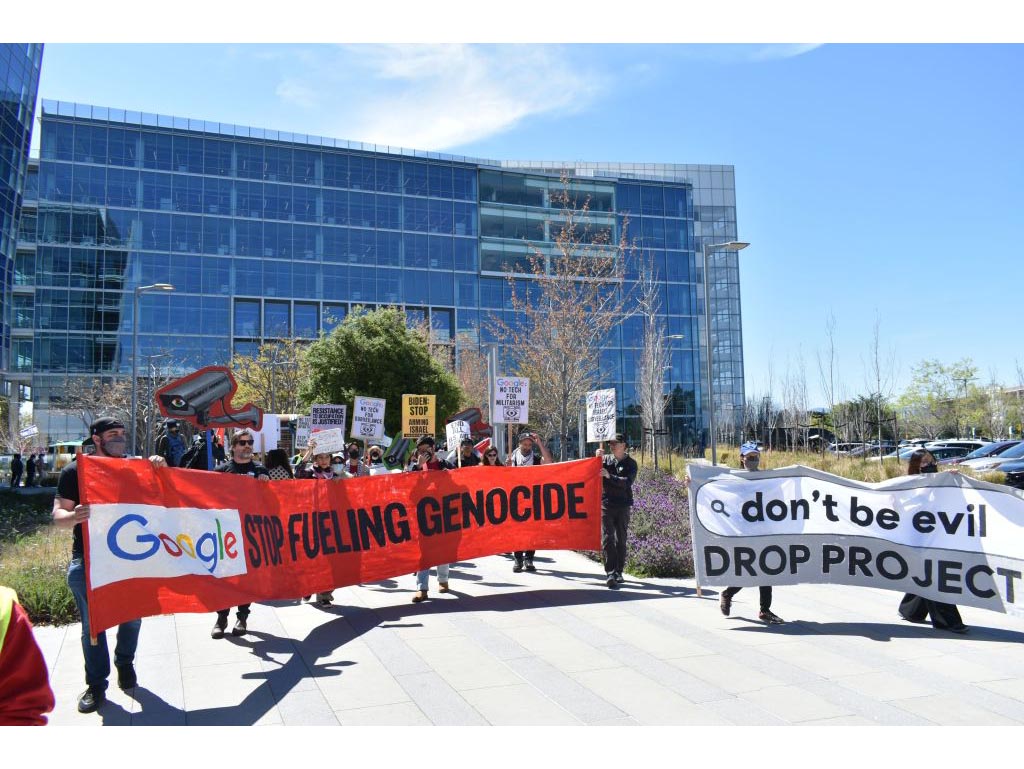News - Advertising
Big tech’s war on Gaza
by Iain Akerman
August 6, 2024
.jpg) Advertisement
AdvertisementIn the not too distant past, working for Google, Amazon, Apple, Meta, or Microsoft was the Holy Grail for any high achieving graduate. They were innovative, they had prestige, they were fitted out with funky workspaces, and they promised lucrative careers for those who were willing to overlook intense workloads and high pressure. Now, big tech finds itself collectively accused of complicity in Israeli apartheid and genocide against the Palestinians.
At the forefront are Google and Amazon, both of whom are involved in Project Nimbus, a $1.2 billion contract to supply artificial intelligence and cloud computing services to the Israeli government. In early March, Google fired a 23-year-old software engineer for interrupting a speech by the managing director of Google’s Israel operation, stating publicly that he refused “to build technology that powers genocide”. The following month, 28 Google employees were fired following protests organised by No Tech For Apartheid, a coalition of tech workers and activists dedicated to the termination of Project Nimbus.
“In these hugely difficult times, we are focused on maintaining a healthy culture and community guidelines for a respectful and inclusive workplace for everyone.”
Their firing was described as an “act of cruel, mass retaliation” by Justice Speaks, an agency specialising in refuting corporate propaganda and supporting workers who are attempting to unionise. In total, 50 Google employees have lost their jobs.
“How can we continue to work with a government which is committing and being investigated for the crime of genocide?” said Mohammad Khatami, a former Google software engineer and one of those fired in April. “How can our company expect us workers to sit quietly while our innovation is being traded away for militarism and empire? Project Nimbus must end.”
Google, however, claims Project Nimbus is focussed solely on providing general cloud services rather than specific military applications.
A Google spokesperson told ArabAd that Google Cloud “supports numerous governments around the world in countries where we operate, including the Israeli government, with our generally available cloud computing services”.
Google has also been “very clear that the Nimbus contract is for workloads running on our commercial cloud by Israeli government ministries, who agree to comply with our terms of service and acceptable use policy,” they added. “This work is not directed at highly sensitive, classified, or military workloads relevant to weapons or intelligence services.”
Despite this assertion, a report by The Intercept in May stated that two of Israel’s leading state-owned weapons manufacturers – Israel Aerospace Industries and Rafael Advanced Defense Systems – are required to use Amazon and Google for their cloud computing needs. Although the extent of those needs are unknown, the firms are responsible for the manufacturing of drones, missiles, and other weapons that are being used by Israel to bomb Gaza. “These relationships with Israeli arms manufacturers place Project Nimbus far closer to the bloodshed in Gaza than has been previously understood,” said The Intercept.
Google’s involvement in Project Nimbus was initially brought to the world’s attention in 2021 by a handful of employees, including Ariel Koren, who said in her resignation statement that the company “systematically silences Palestinian, Jewish, Arab and Muslim voices concerned about Google’s complicity in violations of Palestinian human rights – to the point of formally retaliating against workers and creating an environment of fear”.
In an open letter posted at the end of last year, Google workers also condemned the company’s “internal culture of hate, abuse, and retaliation” following 7 October, noting that “Palestinians have been publicly called ‘animals’ on official Google work platforms, as leadership has stood idly by”.
This fear extends to the Gulf, where employees of Google’s Dubai office have been told that to speak out is a fireable offence. Palestinian and Lebanese employees working in some departments also find themselves in the uncomfortable position of having to report directly into Tel Aviv. Two Russian-Israeli citizens have also been appointed directors, one since the Israel-Hamas war began. Both appointments are believed to be linked to the closure of Google’s Moscow office (in the wake of Russia’s invasion of Ukraine) and to a process of reorganisation that has led to two waves of redundancies in Dubai, the most recent of which was earlier this year. No one at the Dubai office was willing to talk for fear of losing their jobs.
For Google, imposing corporate America’s vision of the world on the Middle East is not a display of arrogance or insensitivity, or a furthering of its complicity in genocide, but of common sense. Despite the historical separation of Israel from the Middle East and North Africa (MENA) region (a separation that extends to sport and international competitions), it is a strategic tech hub, which is why traditional political barriers have been torn down.
“We’re proud of Google’s growing workforce in the Dubai office, that is, like our regional leadership team, diverse and representative of the users, clients and partners we serve in and outside of MENA,” says Google. “This is a highly sensitive time and we have many employees who are personally affected. In these hugely difficult times, we are focused on maintaining a healthy culture and community guidelines for a respectful and inclusive workplace for everyone.”
Amazon and Google’s collaboration with Israel is just the tip of the iceberg when it comes to big tech’s collusion in the silencing of Palestinian voices and the fuelling of Israeli aggression. In December last year, Human Rights Watch released a 51-page report on Meta’s systemic censorship of Palestinian content. It found that Meta had “misapplied its policies on violent and graphic content, violence and incitement, hate speech, and nudity and sexual activity”.
“It’s time for one of the world’s most influential tech companies to take immediate, concrete action to uphold human rights and protect all voices during these times of chaos and aggression.”
--Kassem Mnejja, Access Now MENA
It also noted that it “has inconsistently applied its ‘newsworthy allowance’ policy, removing dozens of pieces of content documenting Palestinian injury and death that has news value.” Shadow banning has become routine, especially on Instagram, and thousands of social media accounts have been deleted, suspended, or had restrictions applied.
In April, Access Now, a non-profit organisation focused on digital civil rights, called on Meta to take immediate action to stop the systematic censorship of pro-Palestinian voices.
“With almost 35,000 killed in Gaza, Meta’s lack of action to the systematic censorship of pro-Palestinian voices is fanning the flames of hate,” said Kassem Mnejja, Access Now’s MENA campaigner. “For years, civil society has been sounding the alarm and calling for reforms on Meta’s platforms. It’s time for one of the world’s most influential tech companies to take immediate, concrete action to uphold human rights and protect all voices during these times of chaos and aggression.”
At the time of writing, at least 36,171 Palestinians had been killed and 81,420 wounded in Gaza since 7 October. An additional 502 Palestinians have been killed in the occupied West Bank and an estimated 1,200 Israelis were killed on 7 October.
Even PayPal, although not among the big five, is guilty of bias. In early May, the Arab centre for social media advancement, 7amleh, issued a position paper on PayPal’s discrimination against Palestinians in the digital economy. In particular, it noted PayPal’s decision to serve Israeli settlers residing illegally in the West Bank, while deliberately denying Palestinians the same service. In addition, it noted that Palestinians residing in Jordan with a Cairo Amman Bank account have access to PayPal, whereas a Palestinian residing in the West Bank or Gaza, with an account in the same bank, is denied access. Such bias, says 7amleh, contributes to PayPal’s human digital rights violations against the Palestinians.
Why is such bias and complicity so rampant? Firstly, Israel has considerable production, innovation, and intellectual property power. It hosts advanced semiconductor manufacturing facilities, such as Intel’s fabrication plant in Kiryat Gat, and Microsoft has a large research and development centre in Herzliya. The latter has been providing services to the Israeli government, the Israeli Ministry of Defense, and the Israeli military for years, while Apple operates research and development centres in Herzliya and Haifa.
“Big tech and the wider industry is getting taken care of for following the script, in terms of capitalism intervention.”
--Shahla Matar, Remarkable Group MENA
According to Steve Ballmer, Microsoft’s former CEO, the company “is as much an Israeli company as an American company”, such is its complicity in Israeli apartheid. Israel also has a vibrant startup ecosystem and is a prolific filer of patents.
Then there’s the encouragement to engage with Israel as part of the US’s broader geopolitical relationship with Israel. “There’s a lot of money, tangible power, lobbying, political support, deals being cut in the background,” says Shahla Matar, chief growth officer for the Middle East and Africa at Remarkable Group.
“We’ve seen it in Obama’s time, we’re seeing it now in Biden’s time, we’ve seen it with Trump and Huawei. Big tech and the wider industry is getting taken care of for following the script, in terms of capitalism intervention.”
However, none of this can stop grassroots activism, despite efforts to crush all dissent by authorities across North America and Europe and by companies themselves, most notably Google. “Essentially, what Palestine is doing at the moment – what this genocide is causing – is challenging the bullshit narrative for the first time,” says Matar. “And it’s very much spearheaded by the US, which is the biggest consumer and believer in this narrative, and the biggest power able to influence the direction of what happens next.
“If we didn’t see these movements – we’re using the example of Google, but I’m talking about the Gaza encampments, the protests on the streets, all the employees that made noise in their different companies, all the smaller politicians that spoke at Congress. If all this wasn’t happening, there is no reason for Biden to even to pretend to draw a limit. The people being on the Palestinian side and coming out of the comfort of big tech, the comfort of elite universities, the comfort of C-suite jobs, and putting themselves on the line to say this out loud, makes everything questionable. And that threatens almost the premise that everything else sits on top of in American democracy.”








.jpg)


.jpg)




